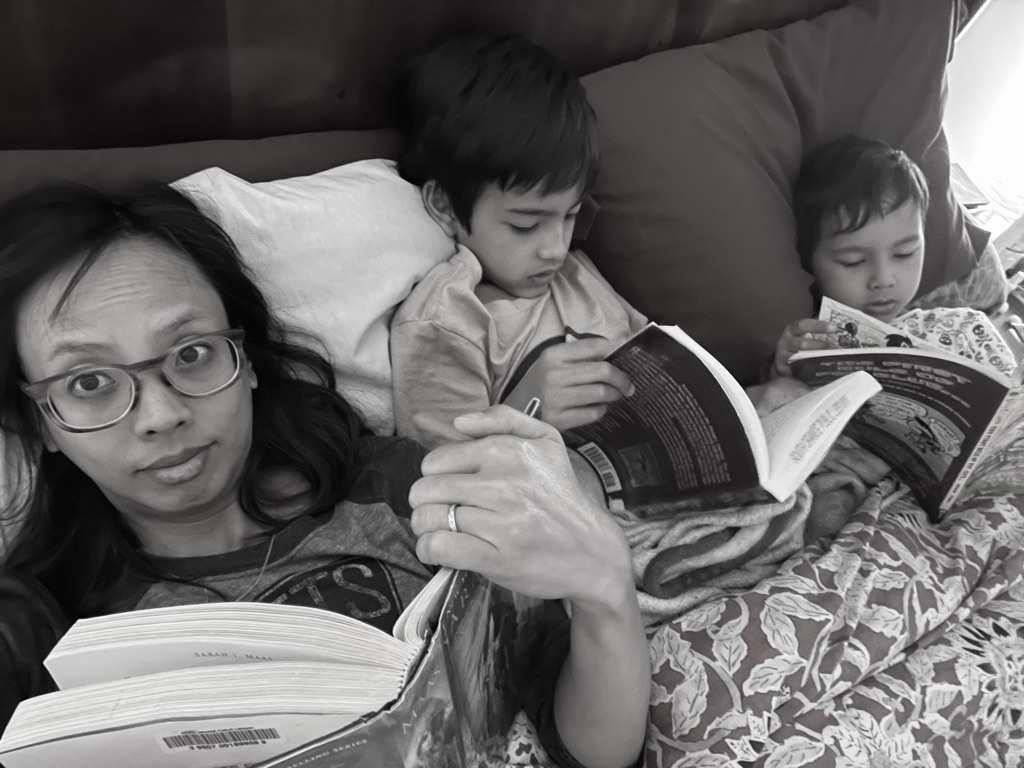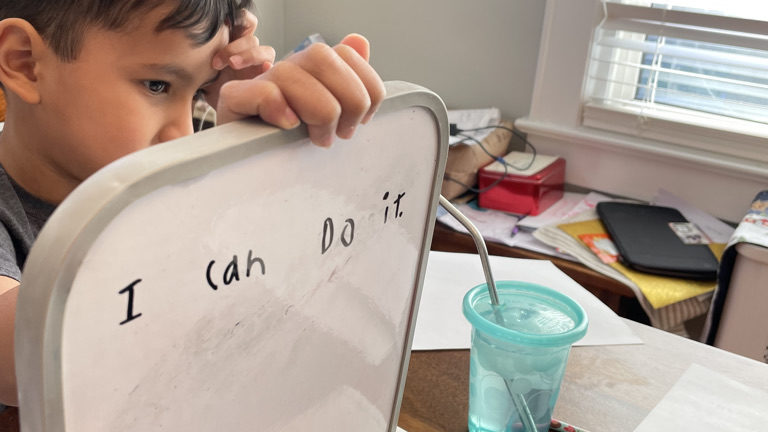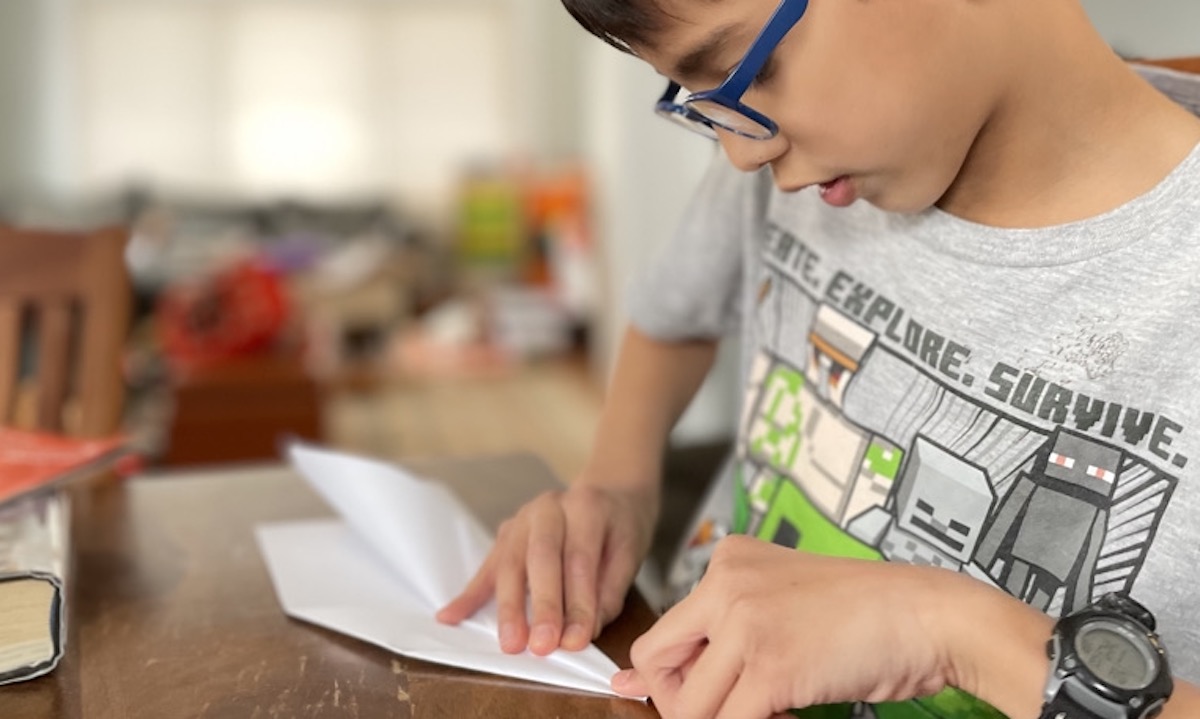This post is part of a paid partnership with BeeAware Allergy; all tips and ideas are the author’s. Get reliable information about bee sting allergy symptoms, as well as testing and treatment options at beeawareallergy.com.
I can’t.
I don’t have the right pencil.
This is too hard!
I will NEVER understand this!
I’m so bad at this!
This is stupid!
Why do I even need to know this?
I can’t.
Eight long months of virtual school gave me a front-row seat to how my kids react when faced with a challenge. Whether it was learning multiplication or struggling through a writing prompt, some assignments triggered a tornado of feelings, thoughts, shouting, and tears from my third grader.
And I hate to admit it, but as a writer who was in third grade more than thirty years ago, my writing process is sometimes pretty similar.
At our last parent-teacher conferences, both my kids’ teachers had some feedback that hit my husband and me close to home. In a nutshell, the kids – now six and ten – are doing fine. Great, even! But at times, they are very hard on themselves. One teacher said, “I know he knows how to do it. It’s just his mindset that needs to change, so he can do the work.”
Oof. It’s hard to see your kids display your own personality traits.
In the go-to manual, Oh Crap! Potty Training: Everything Modern Parents Need to Know to Do It Once and Do It Right by Jamie Glowacki, there’s a whole chapter dedicated to poop. Along with a ton of helpful advice, the author suggests that before potty training, you let your child in the bathroom with you, and you let them watch you poop. “This is the best way to model the behavior you want,” she writes. “They can see that you might take more than a minute. They may see that it could require some facial expressions, some grunting and the like. And they can see that poop falls out of you, into the toilet, and nobody dies because of it.”
My kids have been fully potty trained for years now—and so have I. But I’m a late bloomer when it comes to a different kind of nerve-wracking, messy, and everyday fact-of-life crap: identifying and expressing my feelings. As a human and as a parent, I’m learning more every day about how important and helpful it is for calming the anxiety storm and moving more easily through discomfort. For my children’s emotional and mental health, as well as my own, I’m trying to be more aware of how I process doing hard things and talking about the process as I go.

Here’s what I (try to) do to model working through tough stuff in front of my kids:
1) Name what I’m feeling.
In any given day, there’s no lack of opportunity for me to name when I’m feeling frustrated, worried, nervous, scared, overwhelmed, annoyed, irritated.
By naming what I’m feeling, I’m hoping my kids see what different emotions look like, that they’re realizing these emotions are common and normal, and that they’re temporary.
2) Pause to audibly breathe.
Over the last few years, I’ve realized I often hold my breath reflexively. A deep breath gives me a chance to process, pause, and reset. I’ll be honest and say that sometimes this comes out as more of a deep sigh or an agonized groan. But in any event, the vocalization helps me move through a tough moment. When I’m annoyed at my kids for wrestling with each other instead of brushing their teeth which I have asked them do, “THREE TIMES NOW,” I’ll add in, “I’m taking a deep breath…” If I’m lucky, they take that moment as a cue to run and brush their teeth—and learn that breathing is a way to move through frustration.
3) Try something. Then try something else.
“Try” is such a great word. It takes the pressure off of finding THE solution and emphasizes finding A solution. “Let’s give it a try!” is in every preschool television show episode for a reason. Older kids may grumble when cajoled with “Just try!”, and I get it. Trying is annoying! It feels like a waste of time. They “already know it’s not going to work” or “isn’t right” or “isn’t good enough.”
But it’s so important to be reminded that breaking through the barrier of “I can’t” begins with “I’ll try.” I do this a lot with my younger son who likes to draw. He gets upset with himself when his drawings don’t come out the way he wants. But he is much more understanding when I try to draw next to him. “I tried to draw a bear, but this doesn’t look right at all!” I’ll say. “Maybe I need to make the ears bigger? I’m going to look at a picture to remember what a bear looks like.” It’s a small moment to show that the plan in my head and the execution often don’t match up right away.
4) Take breaks.
My kids know that it takes me a long time to clean the kitchen. They also know that cleaning the house and making them participate makes me grouchy. And they definitely know how much I like to nap, read, and scroll on my phone. When I flop on the couch and stare at my phone, I’ll say, “Okay! Now that I’m done with the dishes, I’m going to take a break for a few minutes before I…”
When doing hard things or an overwhelming number of not-so-hard things, sometimes we need a deep-breath reset, sometimes we need a few minutes to give our brains a break, and sometimes we need a nap. When I hear my kids say, “I need to rest,” I feel proud they’re getting the message. If they know when they need a break, they’re less likely to reach complete meltdown.
5) Acknowledge accomplishments of all sizes.
When things go well, I try (see that word again?) to point out how everyone contributed to making that happen—including me. We recently went away for the weekend. Getting out of the house is usually stressful with packing, not leaving the house a disaster, and refereeing the kids bickering. But this last time, I was pleasantly surprised. My husband and I divided our preparation between us. The kids packed their own clothes, their own entertainment, and their own snacks. When we made it out the door on time and not annoyed with one another, I said, “I’m proud of us!”

This isn’t going to sound wise, but I’ll say it anyway: Doing hard things is…hard.
No matter how old we are, it is so helpful to realize that feelings like frustration, overwhelm, incompetency, and fear are valid and normal. One way we can help our kids learn how to work through struggles is to let them see and hear us work through our own. If your home is anything like mine, you’ll have opportunities to model moving through frustration, overwhelm, incompetency and fear multiple times every day.
P.S. For the record, during potty training, I did let my kids watch me poop once or twice. Ever since then I’ve been happy to model privacy and shutting the bathroom door.

About BeeAware
BeeAware understands that letting kids experience independence – especially in the summertime – can be hard for parents. But with planning, preparation, and modeling the bravery we hope to see in our kids, a summer of fun IS possible. Find out more at BeeAwareAllergy.com.
Click play on the episode below to hear Meagan and Sarah talk about working through the tough emotions that surround letting kids experience increased independence – especially in the summertime:




Love the part about recognizing everyone’s contributions. Great reminder!
I love the phrase “I’m proud of us!” Promotes self efficacy and teamwork! Thanks, Joanne!
Thank you, Jayme!
I needed this today ♥️ I’m working on this right now with my little one and it’s so hard seeing him lack confidence in himself. Thanks for this!